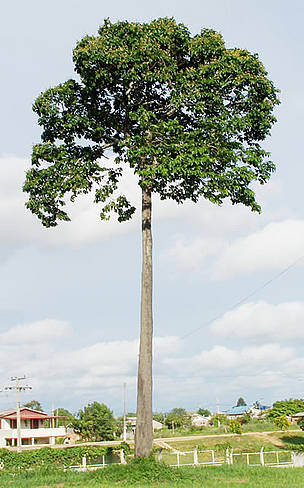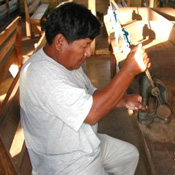One World Projects
Organic Chocolate Bar - 2.5 oz
Organic Chocolate Bar - 2.5 oz
Couldn't load pickup availability
Share
Share the sweet tastes of the Amazon with organic chocolate bars that promote rainforest conservation. 70% Dark Chocolate paired with three sustainably-harvested rainforest treats: Brazil Nut, Quinoa, Coconut, Amaranth, or Golden Berries to make for a healthy and natural snack.
- USDA Certified Organic and Fair Trade
- 70% Dark Chocolate
- Each Bar is 2.5 oz (70 gr.)
- Available flavors: Brazil Nut, Quinoa, Coconut, Amaranth, and Golden Berry
- Also available with a handwoven cotton string bag from Guatemala
Harvested by hand and fair trade imported from Peru.
 The tremendous Brazil nut tree can have a trunk that can be grow to be 8 feet in diameter and can live up to 500 years. The tree has branches and leaves only at the top third of the tree, and its branches can span up to 100 feet. The waxy leaves produce a yellow orchid. This flower, when pollinated by either bees or bats, produces the fruit that contains the brazil nuts.
The tremendous Brazil nut tree can have a trunk that can be grow to be 8 feet in diameter and can live up to 500 years. The tree has branches and leaves only at the top third of the tree, and its branches can span up to 100 feet. The waxy leaves produce a yellow orchid. This flower, when pollinated by either bees or bats, produces the fruit that contains the brazil nuts.
In South America, brazil nuts grow during the 4-month dry season that differs from region to region. The brazil nut is a hard-shelled fruit, similar to a coconut, and takes about 14 months to mature. The fruit is about 4-6 inches in diameter and can weigh up to four pounds. The shell of the fruit is about a quarter of an inch thick and contain between 12-24 nuts.
Brazil nuts are primarily harvested from wild trees during the six-month period of the rainy season. Because the brazil nut trees are so tall, harvesting the fruits consists of gathering the fruit after they fall. Once the fruit falls, it has to be gathered quickly so they are not susceptible to fungus and animals that can carry them away.
Madre de Dios, a mountainous area of pristine forests, is one of the poorest regions of Peru. The most lucrative industry here is the collection and processing of the Amazon (Brazil) nut into oils, candy and candles for export. Unfortunately, few producers are informed or rewarded for extracting the oil in a sustainable manner meaning the region's rates of rainforest destruction are almost as high as its poverty.
Candela Peru is an alternative biotrade organization which began acting as a fair trade business in the brazil nut industry in 1989 in order to improve circumstances for this region of Peru.
Candela Peru, an acronym for "Comercio Alternativo de Productos No Tradicionales y Desarrollo para Latino América" (in English: Alternative Trade of Non Traditional Products and Development for Latin America), works with 266 Peruvian farmers in this part of the Amazon rainforest to harvest the Brazil nut in a socially and environmentally-responsible manner.

Besides creating steady work for rural families, the company helps small producers streamline their production chains for increased capacity and helps them to implement social and environmental projects in their area. In this way, Candela Peru helps improve farmers way of living and promotes forest conservation in a biologically diverse region.
Candela Peru developed an Organic Certification program in 2001 to include Peruvian Brazil nuts in the growing organic market, and works with local producers to obtain their organic certification. The company also hosts classes in forest management to educate farmers on how sustainable forestry practices can offer financial reward.
About the Artisans
About the Artisans
 Esther Kariuki is an independent artisan who continues to make a big impact in villages outside of Nairobi, Kenya, near Kitui.
Esther Kariuki is an independent artisan who continues to make a big impact in villages outside of Nairobi, Kenya, near Kitui.
Esther and her husband train women on banana fiber crafting to empower them to earn money while working from their homes. Banana Fiber which would normally be discarded is used to craft unique pieces taking the leaves from the banana tree to create durable and eco-friendly pieces of art. The products range from whimsical home decor, Christmas nativities, decorative and holiday ornaments, to functional trays/baskets.
The banana fiber is first dried, and then a light varnish applied. Once this process is complete craftspeople cut the fiber into thin strips to make several different items, including boxes, Bao Bab trees and mobiles. The varnish on the banana fiber with its many tones of brown resembles textured tortoise shell. Esther ensures the craftspeople are paid a fair wage for their goods, which has enabled many in her small village to earn a sustainable wage for their household.
Materials
Materials
Dimensions
Dimensions
Care information
Care information





Subscribe to our emails
Subscribe to our mailing list for insider news, product launches, and more.





